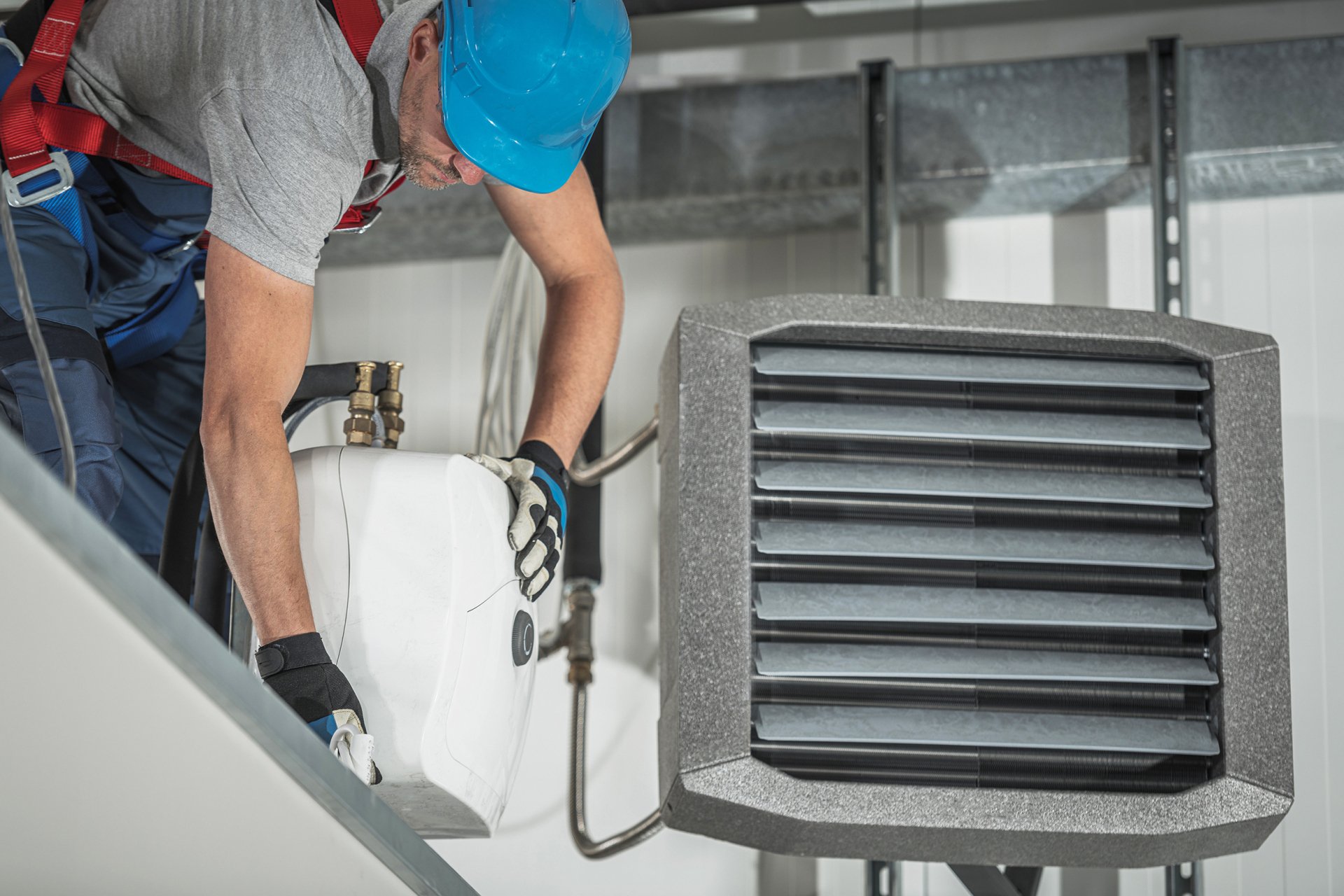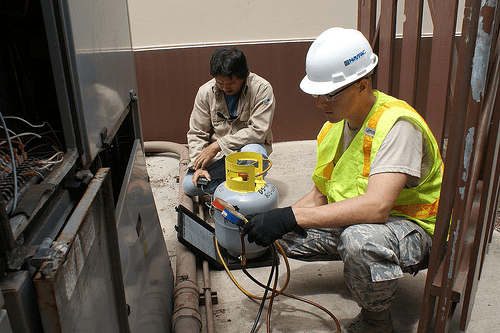Evaluating Brands for heat pump installation ooltewah tn
Evaluating Brands for heat pump installation ooltewah tn
Blog Article
Choosing In Between a Heatpump and Heater: Secret Considerations for Your Heating And Cooling Demands
When examining home heating choices for a/c requires, the decision in between a heat pump and a heating system can be intricate. Each system uses distinct benefits tailored to details climates and power effectiveness objectives. Recognizing these distinctions is crucial for making an informed option. Secret elements such as installation prices and ecological effect additionally make complex the choice procedure. Which option genuinely lines up with one's convenience and sustainability choices? The complying with sections will check out these factors to consider thoroughly.
Recognizing Warm Pumps: Just How They Work and Their Benefits
While many homeowners think about numerous heating alternatives, recognizing exactly how heatpump function and their benefits can greatly affect their choice. Heatpump operate by transferring warmth instead of producing it. In the wintertime, they remove warmth from the outside air or ground and move it indoors, while in the summer season, they reverse this process, cooling the home by removing warmth outside. This double performance makes them functional for year-round climate control.One of the key advantages of heat pumps is their power performance. They use substantially less power contrasted to standard heater, potentially leading to reduced utility expenses (heat pump installation ooltewah tn). Furthermore, warmth pumps have a smaller carbon footprint, making them an eco friendly selection. They also need less upkeep than conventional systems, contributing to long-term expense financial savings. On the whole, recognizing the technicians and benefits of warmth pumps can help property owners make educated decisions regarding their heating and cooling down requirements
Checking Out Heaters: Kinds, Operation, and Benefits
Furnaces are available in various types, consisting of gas, electric, and oil models, each with unique operational mechanisms. Recognizing these distinctions is vital, as they influence performance and home heating efficiency. Furthermore, furnaces supply many benefits, such as regular heat outcome and integrity in cooler environments.
Types of Heaters
Home heating systems can differ substantially in style and procedure, with furnaces being a preferred choice among house owners. There are several sorts of furnaces, each utilizing various gas sources and innovations. Gas heating systems prevail, leveraging gas to generate warm successfully. Electric furnaces, on the other hand, utilize electrical resistance to produce heat, typically preferred for their straightforward installation. Oil heaters, while less typical, work in locations with restricted gas gain access to (heat pump installation ooltewah tn). Furthermore, condensing heating systems make best use of power performance by catching and reusing exhaust gases. Each type runs with a system of warm exchangers and ductwork to disperse warm air throughout a home. Understanding the distinctions between these heating system types is vital for informed cooling and heating decisions
Advantages of Heaters
For property owners looking for reputable heat during cool months, the benefits of heaters are considerable. Heaters give constant heating, making sure also temperature levels throughout the home. They are particularly reliable in extreme cool, commonly surpassing warm pumps in freezing conditions. Various kinds, consisting of gas, electric, and oil furnaces, supply versatility to meet diverse requirements and preferences.Furnaces likewise have a tendency to have reduced first setup prices contrasted to warm pumps, making them a more easily accessible option for numerous. Their robust design contributes to a longer life expectancy, with lots of systems lasting over 15 years with proper maintenance. Furthermore, modern furnaces are often outfitted with sophisticated technology for improved performance, which can result in lowered energy costs. Generally, heating systems remain a dependable option for efficient home heating.

Power Efficiency: Comparing Warm Pumps and Furnaces
When comparing energy effectiveness between warm pumps and heaters, the Seasonal Power Performance Proportion (SEER) plays a vital role in establishing performance. Additionally, a functional expense evaluation reveals the long-lasting financial implications of each system. Understanding these elements can assist property owners in making notified choices concerning their home heating solutions.
Seasonal Power Performance Ratio
Power performance plays a crucial function in the decision-making procedure between heat pumps and heating systems, specifically when taking into consideration the Seasonal Power Effectiveness Ratio (SEER) This statistics steps the cooling performance of heatpump over an entire air conditioning season, supplying a standardized means to assess efficiency. Greater SEER rankings show greater energy effectiveness, converting to lower power intake and reduced utility bills. On the other hand, heating systems are normally examined utilizing the Annual Gas Application Performance (AFUE) ranking, which reflects heating efficiency. When contrasting these 2 systems, home owners should focus on SEER rankings for heatpump, as they directly influence total power financial savings and ecological sustainability. A comprehensive understanding of SEER can especially influence the lasting fulfillment and cost-effectiveness of the selected a/c service.
Functional Cost Analysis
Recognizing the operational prices related to heatpump and heating systems is important for home owners reviewing their choices. Heat pumps commonly provide greater power effectiveness, converting electrical energy right into heat with very little waste. This results in lower month-to-month energy bills, especially in moderate climates. Conversely, standard furnaces, specifically gas models, might have lower ahead of time prices however can incur higher functional costs over time as a result of fuel costs and efficiency ratings.Moreover, heatpump can function as both heating and cooling down systems, possibly minimizing the need for different cooling and heating units. While first financial investments for heatpump may be greater, their long-lasting cost savings in power effectiveness can make them a more cost-efficient choice for many houses. Cautious evaluation of regional power prices is vital to establish the very best option.
Setup Costs: What to Anticipate for each and every Furnace
Installment expenses for heater can vary considerably in between heatpump and heaters, affecting homeowners' decisions. Warmth pumps normally have higher upfront installation costs, typically varying from $3,500 to $8,000, relying on the system size and intricacy of installment. This includes the outside device, interior handling system, and essential ductwork modifications. Alternatively, heating systems have a tendency to have lower preliminary expenses, averaging in between $2,500 and $6,000, which can be appealing for budget-conscious house owners. Nonetheless, installation costs can boost if comprehensive ductwork is required.Moreover, the choice of fuel type for heating systems-- natural gas, lp, or electrical-- can additionally impact installation costs. While heatpump offer energy efficiency, their initial investment might deter some buyers. Ultimately, examining installation costs alongside lasting savings and performance will assist house owners in making informed decisions regarding their heating unit.
Environment Considerations: Which System Carries Out Better in Your Location
Just how do environment conditions affect the effectiveness of heater? The efficiency of warmth pumps and furnaces can vary significantly relying on the neighborhood environment. In modest climates, heat pumps stand out by efficiently moving warmth from the outdoors air, making them an energy-saving choice. Nevertheless, their effectiveness lessens in very cool temperatures, where they may battle to draw out enough heat. Alternatively, heating systems, especially gas designs, give trusted and constant heat despite outdoor conditions, making them preferable in cooler regions.In locations that experience milder winter seasons, heatpump can run properly year-round, supplying both cooling and heating. On the other hand, regions with extreme wintertimes commonly take advantage of the toughness of heating systems. Eventually, recognizing the local climate is his explanation essential when choosing in between a heat pump and a heating system, as it straight impacts their operational performance and general performance.
Upkeep Demands: Long-Term Take Care Of Warm Pumps vs. Furnaces
While both heatpump and furnaces require regular upkeep to guarantee peak performance, their certain demands and care routines differ significantly. Heating systems normally need less constant interest, with annual examinations sufficing to inspect for gas leaks, tidy filters, and analyze overall functionality. Their simpler layout commonly enables for uncomplicated repairs.In contrast, warm pumps necessitate biannual maintenance due to their double role in cooling and heating. This consists of cleansing coils, checking refrigerant levels, and making sure that both the exterior and interior units operate at their ideal. Furthermore, heatpump upkeep commonly includes even more elaborate elements, making specialist maintenance essential.Neglecting maintenance can result in lessened performance and boosted power costs for both systems. Inevitably, homeowners ought to think about these long-term treatment needs when picking in between a heatpump and a heater, as proactive maintenance can prolong the lifespan and performance of either system substantially.
Ecological Effect: Choosing a Lasting Heating Option
The environmental effect of heating unit is a crucial analysis for property owners seeking sustainable alternatives. Heat pumps are typically a lot more energy-efficient than traditional heaters, as they transfer heat instead of produce it, considerably minimizing carbon discharges. By using renewable resource sources, such as air-source or geothermal warm pumps, homeowners can even more lessen their ecological footprint.On the various other hand, all-natural gas heaters discharge greenhouse gases and contribute to air contamination, though they commonly provide greater warm output. Improvements in technology have led to the advancement of high-efficiency heating systems that lessen emissions.Ultimately, picking a home heating system includes weighing efficiency against environmental influence. Homeowners are encouraged to assess neighborhood power sources and incentives for renewable systems, making go to website certain a selection that lines up with both individual convenience and environmental duty. The decision impacts not only instant comfort yet additionally long-term sustainability and ecological health.
Often Asked Questions
How Lengthy Do Warm Pumps and Furnaces Typically Last?
The life-span of warmth pumps commonly ranges from 15 to twenty years, while furnaces can last between 15 to 30 years. Normal upkeep substantially influences their durability and effectiveness in giving home heating options.
Can I Utilize a Heatpump in Very Cold Climates?
Heatpump can operate in very cold climates, yet their effectiveness decreases as temperature levels decline. In such conditions, supplemental heating sources might be needed to maintain comfy indoor temperature levels and assure peak efficiency.

What Is the Noise Degree of Heat Pumps Versus Furnaces?
The noise levels of heatpump and heating systems differ significantly. Typically, heat pumps run more silently than standard heating systems, making them more suitable for those sensitive to appear, while heating systems may create louder operational sounds throughout heating cycles.
Are Heat Pumps Suitable for Both Home Heating and Cooling?
Warm pumps are certainly suitable for both cooling and heating (heat pump replacement ooltewah tn). They work by moving warm, providing efficient temperature control year-round, making them a versatile selection for property owners looking for an all-in-one cooling and heating solution
What Dimension Heater Do I Required for My Home?
Figuring out the proper size furnace for a home needs examining aspects such as square footage, insulation quality, neighborhood environment, and the home's design. Consulting an expert can ensure an exact assessment and excellent comfort. Warm pumps commonly provide higher power efficiency, transforming electric power right into heat with marginal waste. In moderate climates, warm pumps succeed by effectively transferring heat from the outdoors air, making them an energy-saving alternative. Conversely, furnaces, particularly gas models, offer regular and reliable heat regardless of outdoor conditions, making them better in chillier regions.In locations that experience milder winter seasons, like this heat pumps can operate efficiently year-round, giving both home heating and air conditioning. Heat pumps are usually much more energy-efficient than standard heating systems, as they transfer warmth rather than produce it, greatly reducing carbon emissions. By using sustainable power resources, such as air-source or geothermal warmth pumps, home owners can even more decrease their ecological footprint.On the other hand, natural gas furnaces discharge greenhouse gases and contribute to air pollution, though they usually supply higher warmth outcome.
Report this page